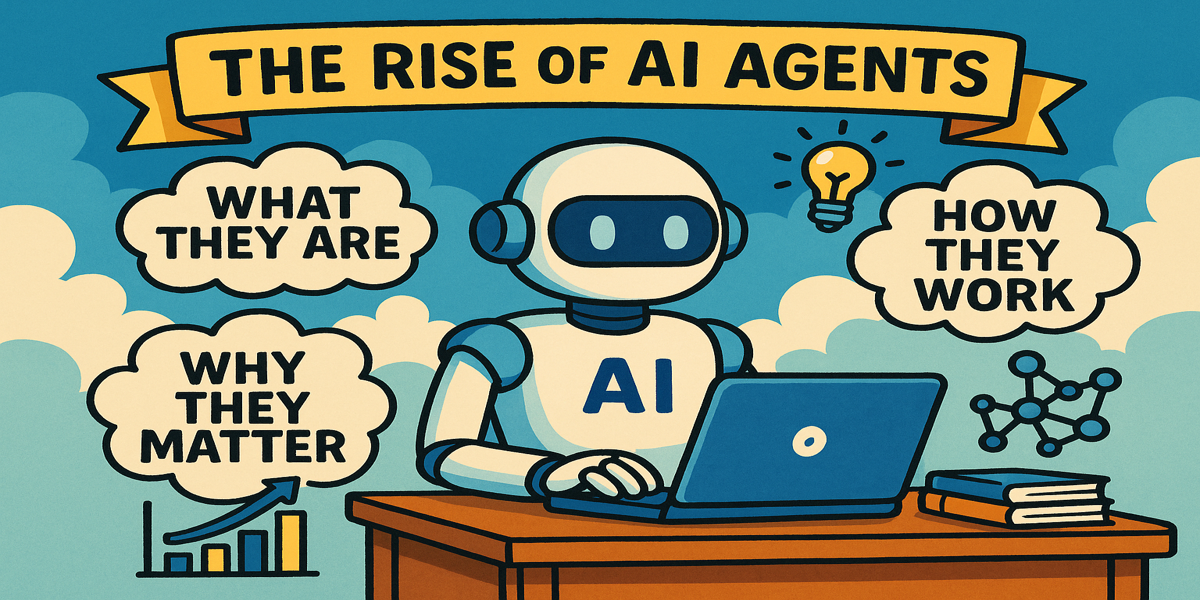Artificial Intelligence is evolving fast, and one of its most impactful developments is the rise of AI agents. These intelligent, autonomous systems are reshaping how people work, make decisions, and go about daily life. By combining reasoning, planning, and memory, AI agents can automate tasks, adapt to change, and continuously improve.
What Are AI Agents?
AI agents are software programs that can carry out tasks independently. They understand goals, decide how to achieve them and adjust if something changes. Unlike traditional bots, they don’t just follow rules - they think, act, and learn. Built on large language models (LLMs), AI agents connect to tools, APIs, and data sources. This allows them not only to understand human input but also to act - like analyzing reports, sending emails, or managing tasks. Some work alone, while others operate in groups, collaborating to complete more complex workflows. They evolve with use, becoming smarter and more helpful over time.
How Do AI Agents Work?
Every AI agent starts with a goal - usually set by a user. It breaks this goal into smaller tasks and plans how to complete them. Then, it uses available tools, retrieves needed data, and adjusts along the way. If new information is required, the agent can search for it, call other tools, or even consult other agents. Over time, it builds memory from past actions and feedback to improve its responses. Some agents reason and plan after each action (ReAct), while others plan and follow a pre-defined sequence (ReWOO). Both approaches allow agents to function effectively and flexibly.
AI Agents in Business
In business, AI agents are transforming operations. In customer service, they answer questions, resolve issues, and escalate only when necessary. In sales and marketing, they help by analyzing customer data, automating outreach, and personalizing communication. Human Resources teams use them to screen resumes, schedule interviews, and support onboarding. Operations teams deploy them to track inventory, predict demand, and optimize logistics. These agents increase productivity, reduce manual errors, and let people focus on higher-level strategy and decision-making.
AI Agents in Everyday Life
Outside of the workplace, AI agents are quickly becoming digital life assistants. They help individuals manage calendars, send reminders, plan travel, and track finances. In research and learning, they summarize documents, provide recommendations, and support skill-building. By handling everyday tasks, AI agents help reduce mental clutter and give people more time for creativity, leisure, and personal growth.
Types of AI Agents
There are several types of AI agents. Simple reflex agents respond to conditions using pre-set rules but don’t retain memory. Model-based agents incorporate internal states, using past input to make better decisions. Goal-based agents act with a specific outcome in mind, choosing the most effective steps to reach it. Utility-based agents go further, selecting actions based on which will provide the most benefit. Learning agents are the most advanced - they adapt, evolve, and improve through experience.
Why AI Agents Matter
What makes AI agents so important is their ability to shift how work is done and how life is organized. They democratize access to advanced tools and skills, allowing individuals and teams to focus on what matters most. By automating repetitive tasks and offering real-time insights, AI agents promote smarter workflows, clearer thinking, and faster results.
The Future of AI Agents
Looking ahead, AI agents will play an even bigger role. As their design improves, they will become easier to use, more context-aware, and increasingly collaborative. They’ll support deeper personalization, assist with complex problem-solving, and operate more safely and ethically. The potential impact spans industries and everyday life. From startups to global enterprises, from students to retirees, AI agents are emerging as key partners in navigating a digital future.
The rise of AI agents isn’t just about technology - it’s about rethinking how we get things done. These digital systems bring intelligence and autonomy to software in once unimaginable ways. As they continue to evolve, they promise to make life more efficient, work more meaningful, and innovation more accessible than ever before.



